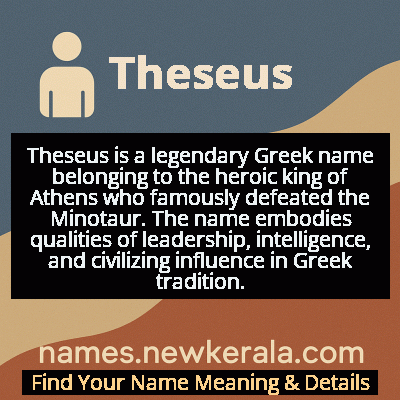Theseus Name Meaning & Details
Origin, Popularity, Numerology Analysis & Name Meaning of Theseus
Discover the origin, meaning, and cultural significance of the name THESEUS. Delve into its historical roots and explore the lasting impact it has had on communities and traditions.
Name
Theseus
Gender
Male
Origin
Greek
Lucky Number
7
Meaning of the Name - Theseus
Theseus is a legendary Greek name belonging to the heroic king of Athens who famously defeated the Minotaur. The name embodies qualities of leadership, intelligence, and civilizing influence in Greek tradition.
Theseus - Complete Numerology Analysis
Your Numerology Number
Based on Pythagorean Numerology System
Ruling Planet
Neptune (Ketu)
Positive Nature
Intuitive, analytical, spiritual, and inquisitive.
Negative Traits
Secretive, reserved, aloof, and can be overly critical.
Lucky Colours
Green, yellow.
Lucky Days
Monday.
Lucky Stones
Cat’s eye, moonstone.
Harmony Numbers
1, 5, 6.
Best Suited Professions
Scientists, researchers, spiritual leaders, detectives.
What People Like About You
Depth of knowledge, analytical skills, spirituality.
Famous People Named Theseus
Theseus of Athens
Mythological King
Slayer of the Minotaur and unifier of Attica
Theseus (Historical Figure)
Athenian Statesman
Credited with democratic reforms and naval expansion
Theseus Scamander
Literary Character
Character in Mary Renault's historical novels about ancient Greece
Name Variations & International Equivalents
Click on blue names to explore their detailed meanings. Gray names with will be available soon.
Cultural & Historical Significance
Beyond his mythological exploits, Theseus was credited with significant political achievements that shaped Athenian identity. He was said to have synoecized (unified) the scattered towns of Attica into the city-state of Athens, establishing democratic institutions and the Panathenaic Festival. This dual role as both monster-slayer and city-founder made him the archetypal civilizing hero, bridging the gap between the age of monsters and the dawn of organized society. His complicated relationships with women like Ariadne, Phaedra, and Hippolyta, along with his eventual tragic downfall, add psychological depth to his character, making him one of mythology's most complex and human heroes.
Extended Personality Analysis
Individuals named Theseus are typically associated with leadership qualities, strategic thinking, and a strong sense of justice. Like their mythological namesake, they tend to be problem-solvers who approach challenges with both courage and intelligence rather than brute force alone. They often display remarkable resilience and adaptability, capable of navigating complex situations (symbolized by the Labyrinth) while maintaining their moral compass. There's usually a strong sense of responsibility to their community or family, coupled with an innovative spirit that seeks to improve systems and overcome obstacles through clever solutions.
However, the Theseus personality also carries shadows from the mythological tradition. They may struggle with impulsiveness in personal relationships or exhibit a tendency toward overconfidence after successes. The original Theseus's abandonment of Ariadne and tragic relationships suggests potential difficulties with emotional commitment or gratitude. Yet there's often a capacity for growth and self-reflection, as the mythological Theseus eventually faced the consequences of his actions and gained wisdom through suffering. This combination makes the Theseus personality both inspiring and human—flawed but fundamentally noble, with the potential for both great achievements and meaningful personal evolution.
Modern Usage & Popularity
In contemporary times, Theseus remains a rare but meaningful choice, primarily used by parents with strong interests in classical literature, mythology, or history. The name has never ranked in popular baby name lists in English-speaking countries, maintaining its status as an distinctive and intellectual selection. Its usage is most common in Greece itself, where it carries national significance, and among academic or artistic families elsewhere who appreciate its mythological weight. Recent years have seen a slight increase in usage, possibly influenced by popular media featuring the character and a growing trend toward mythological names. However, it remains firmly in the 'uncommon but recognizable' category, unlikely to become mainstream due to its strong mythological associations and formal sound.
Symbolic & Spiritual Meanings
Theseus symbolizes the triumph of human intelligence and civilization over chaos and primal forces. The Labyrinth represents life's complexities and challenges, while the Minotaur embodies the monstrous aspects of nature and human psychology that must be confronted and overcome. The thread Ariadne provides symbolizes the importance of wisdom, planning, and sometimes external help in navigating difficult situations. Theseus's unification of Attica represents the human impulse toward community, order, and political organization. The 'Ship of Theseus' philosophical paradox—questioning whether an object that has had all its components replaced remains fundamentally the same object—adds layers of meaning about identity, continuity, and transformation. Ultimately, Theseus embodies the journey from individual heroism to civic leadership, from solving immediate dangers to building lasting institutions.

